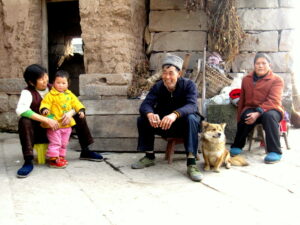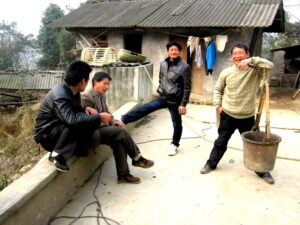Interview with Julia Chuang and “Scandals of the Absent”
 Julia Chuang is a Ph.D. student in Anthropology at the University of California, Berkeley. In 2010 she received a Dissertation Fieldwork grant to aid research on ‘Scandals of the Absent: Migration, Village, and Homecoming in Rural China,’ supervised by Dr. Michael Burawoy. We reached out to her recently to learn more about her ambitious two-sited ethnographic project.
Julia Chuang is a Ph.D. student in Anthropology at the University of California, Berkeley. In 2010 she received a Dissertation Fieldwork grant to aid research on ‘Scandals of the Absent: Migration, Village, and Homecoming in Rural China,’ supervised by Dr. Michael Burawoy. We reached out to her recently to learn more about her ambitious two-sited ethnographic project.
Whom or what inspired you in choosing your specific research topic or area?
I think it initially reading life that drew me toward rural Chinese life. I love the genre of classic village anthropologies – there is something about the village as a container of endogamous, rich social life that has inspired the old studies of kinship – old-fashioned stuff, to be sure, but still I think the best of ethnographic writing. As a form, the village ethnography is old-fashioned, but rural life is ever important in the contemporary age – despite the fuss over urbanization, still most of the world’s population lives in rural settings, and actually, understanding what’s happening in rural settings helps explain why our urban settings look the way they look. Specifically, my work is about departures, about what happens to the people who go to cities, before they actually get to cities.
Reading that old stuff reminded me of a kind of a reverse analytic move I like which comes up a lot in the classic village ethnographies. It came up in various forms in ethnographies from the 1970s: how can we illuminate things about ourselves we take for granted? – we travel to distant edge civilizations. How can we understand the unspoken social norms of a community? – we look for people who violate those norms. How can we best understand migrations to cities? – we should look at the people who never left the countryside.
 What was it like doing fieldwork in two places very far apart from one another? What challenges arose from that arrangement?
What was it like doing fieldwork in two places very far apart from one another? What challenges arose from that arrangement?
The two-site ethnography is totally indispensable – only variation illuminates underlying causes – but also highly trying. I had actually started doing fieldwork in a totally different village, different province, but two months in ran into some troubles with research access there, so had to pick up and start over. Starting over turned out to be such luck – seeing similar things in a different place allowed me to think bigger, wonder about the reasons for commonality and variation in rural life. What I didn’t expect, though, was the difficulty of transitioning: each new site required about two months of adjustment, new dialect, new people, new access issues. I find those transitions terribly difficult – there’s that first page of Tristes Tropiques where Levi-Strauss mentions the “bondages” of fieldwork: days and weeks spent in idle, sheer boredom. Obviously the first months in a new site are exhilarating – new site, fresh eyes, clean notebook –, but despite fresh eyes I was totally illiterate and therefore also idle and anxious for about two months after every site transition.
Your research had you observing and thinking with such particular elements of village life and lives as rumor, gossip, memory, etc. What was it like to encounter these very situated and personal discourses as an impartial researcher from abroad? Did you ever feel like you were being voyeuristic?
There are so many great things written about the politics of the ethnographic encounter. My subject matter was gossip and rumor, and so I had to intrude into very intimate spaces – I asked a lot of personal questions about marriageability and personal finances, and people were very open with me, but always in exclusionary ways: now that I’ve told you this, I trust you won’t speak with my such-and-such nemesis as well. It took time and discretion to develop confidences and then cross sides and develop new confidences across adversarial village relations, which was seditious but totally necessary for the research. There was one incident early on which I learned from: I made the terrible mistake by actually participating in the village rumor mill, in addition to soliciting and recording gossip about various villagers, an attempt to open people up. Of course it all blew up in my face later when the subject of the rumor I passed along confronted me over what was said. It was an ugly confrontation, and uncomfortable, and for me it revealed the vanity of the encounter, how quick I was to betray a grave confidence for a couple remarks recorded in my notebook!
How do you see your work contributing to the anthropological literature concerning migration?
I think migration and mobility is such a personal, intimate experience – harrowing and unmooring for some, highly pleasurable for others. We have so many ways of talking about this – the sojourner, the stranger in the city, diaspora, homeland – a whole stew of idioms and concepts about what it means to leave home and return, or to arrive in a new place with no hope of return. These experiences are produced by this very peculiar logic of capitalism and the state – the erection of exclusive borders, the development of wage gaps, of underdevelopment in origin sites. I think my work tries to connect those two things: the subjective experience of movement and the logic of development, in rural China, where people enjoy wide spatial mobility, but limited social mobility.
Are you a current or past grantee and want to be featured in a mini-interview on our blog? Contact Daniel (dsalas@wennergren.org) to find out more.